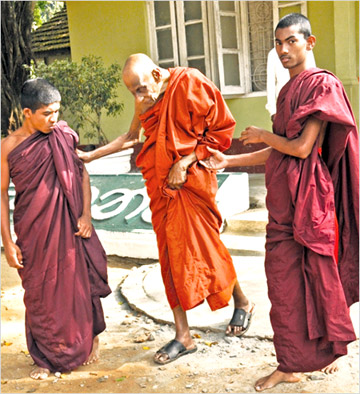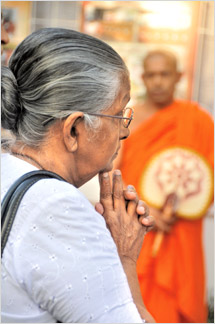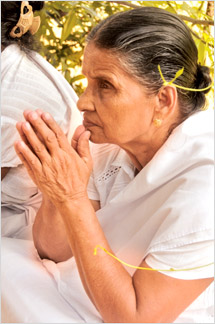|
[Buddhist spectrum]
Happiness can be grown
Dr Senarath Tennakoon
Punya/punna means merit or meritorious action or virtue. Sometimes it
is used to refer to the results or the potential results of good
volition (karma). Punya is necessary to overcome defilements (klesha),
and knowledge or awareness (jnana) to overcome ignorance (avidya). A
field of merit (punya-ksetra/punnakhetta) is an individual or a group
that is a worthy recipient of a gift. After a Buddha, the greatest field
of merit is said to be the monastic order (Sanga) and gifts or donations
made to monks are believed to produce greater merit than gifts to other
recipients.
|

Helping the elders is one meritorious deed.
Picture by Saman Sri Wedage. |
According to Mahayana teachings a being needs to accumulate
sufficient stores of merit and awareness to progress along the path (Kewon,
2003). There are several noble observations of the Buddha on merit. One
who performs deeds of merit is happy in this world as well as in the
next world. One should not think small of the effects of merit. When the
merit doer, goes to the next world the results of his merits receive him
as a dear kinsman who has returned from afar (Siri Seevali, 1958).
The Buddha has very clearly considered the brevity and vicissitudes
of human life and advised all to do good and live a pure life for none
who is born can escape death (Nanaponika & Bodhi, 2007).
The ten meritorious deeds are 1. Charity or Generosity (dana) is a
key Buddhist virtue and a source of great merit (punya) which is
instrumental in overcoming selfishness and sensual attachment.
Through the practice of dana the defilements such as greed, hate and
delusion are eradicated. These defilements obstruct the path that leads
to liberation from samsara. As indicated in the Dhammapada generosity
leads to happiness in the present life and the next of the donor. In
Theravadian context, dana refers to the giving of alms by the lay people
to the monks, while in Mahayana it refers to the Perfection of
Generosity (dana-paramita).
Happiness and strength
The Buddha explained to the noble woman disciple Suppavasa that the
benefits of giving food are long life, beauty, happiness and strength (Nanaponika
& Bodhi 2007). The motive of the donor should be to clean the mind from
greed and selfishness and not with expectation for benefits or to enjoy
the effects of donations in the next birth. The recipients are the
Buddha, Dhamma and Sangha in the case of Buddhists. Those who are in
need of donations such as the beggars, the poor and the destitute too
are among the other recipients. Dana can be offered even to animals but
the merit reward is less than that offered to a poor human being. The
merit acquired by a poor person sharing his food with another poor
person is more than a rich person giving away packets of food to the
poor in a ceremonial manner.
Virtue of Morality (sila) is guided behaviour and virtue through
right conduct, right speech and right livelihood. Codes of conduct have
been prescribed to the followers of the Buddha, as for the Bhikkus (Bhikku
Sila), Bhikkhunis (Bhikkuni Sila), Novices (Samanara Sila) and
householders (Gahatta Sila). The lay people are expected to take the
three refuges and observe the five precepts or ajiva attangika sila (niyata
sila) always and extend it to eight or ten precepts on full moon days or
any other convenient day. These precepts are not commandments and they
are not enforced by any religious authority as the Buddhists on their
own accord prescribe to follow these when for instance they venerate the
triple gem and observe religious practices.
The Silas are derived from the conduct of the Buddha, and are
essentially a condensation of the moral behaviour of the enlightened (Keown,
2003). In Mahayana Buddhism it is the second of the perfections.
Practical attention
Medition/Mental Culture/Cultivation (bhavana) refers to mental
culture or mental development.
It is essentially any type of meditational practice involving
continuous attention by the mind to any suitable object. Meditation aims
at producing a state of perfect mental health, equilibrium and
tranquility (Rahula, 1959). Contemplating on either the forty exercises
for attainment of mental tranquility (samatha) or the three salient
marks of tilakkana – impermanence, misery and absence of substantial
entity (vipassana).
There are other forms of meditation like anapanasati (mindfulness of
the breath) asubainusati (meditational practice on the ten stages of
decay which a corpse passes through), Buddhanusati (meditation on the
salient qualities of the Buddha) and marananssati (mindfulness of
death).
There are two types of meditation in Buddhism calming meditation (samantha)
and insight meditation (vipassana).
The Digha-Nikaya states fourfold blessings of developing samadhi
bhavana vizpresent happiness through the four absorptions knowledge and
vision (gnana-dassana) – probably identical with the Divine Eye (abhinna)
– through perception of light mindfulness and clear conception through
perception and thoughts and extinction of all cankers (asavakkhaya)
through the understanding of the arising and passing away of the five
groups forming the objects of clinging (skandha). Concentration (samadhi)
is one of the seven factors of enlightenment (bojjhanga) and one of the
five spiritual faculties and powers (bala), and the last link of the
Noble Eightfold Path (Pemaloka, 2002).
Reverence (apacayana) is paying the due respect and reverence to the
Buddha, Dhamma and the Sangha (triratna), the parents teachers and
others who are respectable and virtuous individuals. The Maha Mangala
Sutta declares this reverence and respect those who should be respected
(puja ca pujatya nan). In the Dhammapada the thousands section (sahassa
vagga) verse number ten states thus
Abhivadana silassa-niccan vajjapachino chattaro dhamman vaddanthi ayu
vanna sukan balan, which means that those who always respect the
virtuous and minister the elders will develop four states – longevity,
beauty, bliss and power. (Siri Seevali 1958).
Social institutions
Service (veyyacca) is offering help or assistance to those who are
virtuous and worthy of being looked after and helped as well as offering
service to social institutions and to those in distress. Even keeping
the house, school, temple and any other institution clean and tidy comes
under this area of service.
Usually the female devotees use to sweep the temple grounds whenever
it deems necessary and generally the young Buddhist monks sweep the
temple premises in the mornings every day. Serving the aged, the sick
and the weak is a great service.
How the Buddha served the sick monk Putigattatissa whose body was
covered with putrid smelling boils is quite exemplary to all human
beings. The Buddha personally attended Tissa while other monks followed
suit. In Sri Lanka there are several voluntary organizations dedicated
to the service of distressed and poverty stricken human groups. Funeral
Assistance Societies are observed in almost all the villages in Sri
Lanka.
Transference of merit (pattidana) is the practice of requesting
another to share the benefits of merit deeds performed by one by
another.
The Buddhists often take part in performing meritorious deeds in the
name of their dead relations or in the name of their sick relatives.
Some donate lands, buildings and many costly religious equipment to the
Buddhist temples. Most common is the offering of alms to the Sanga. When
one of our relatives passes away we offer alms to the Sanga at
prescribed intervals of time. There are several holy stanzas in Pali
that are recited while offerings are made of a religious nature which
indicate the transference of merit to others for instance to the dead
relatives and the gods (devas) and to all beings including the devas.
Viz
Idan ho gnatinan hotu-sukita honthu gnatayo
Yata varivahapura-paripurinetu sagaran-evameva itodinnan-petanan
upakappatu.
Uttama udakan vattayanyata ninan pavattati
Evameva itofinnan petanan upakappatu which means that let our
relatives receive this merit and become well. Like the full rivers fill
the ocean let the merit offered from this world be received by those in
the other world. Like the rain water flowing from a high elevation
downwards, let the merit from this world reach those in the other world.
Usually at the end of a sermon by a Buddhist monk the following Pali
stanza is recited.
Akasattacha bhummatta – devanaga mahidika
Punnatan anumodittva chiran rakkantu loka sasanan which means let the
devas and nagas with great magical powers dwelling in the sky and earth,
share the merits and protect the world and the doctrine (sasana).
Offering alms
Rejoicing over other's merits (pattanimodana) is sharing the merits
of others with a sense of humane delight. It is said in the Buddhist
texts that a woman who rejoiced when Purvarama was offered to the Buddha
by Visaka, this poor woman too acquired merit equal to that of Visaka.
Apart from the active participants in a religious function such as
offering alms to the Sanga there are others who are passive participants
who join hands with the active participants.
They take part in the proceedings and join in listening to the sermon
by the Buddhist monk and derive the merit through mere participation.
When some one rejoices at the good deeds done by his friend one gets the
merit of pattanumodana.
Listening to the Dhamma (Dhamma Savana) is the practice of listening
to the Dhamma preached by a learned person (usually a learned Buddhist
monk) by the devotees with sustained interest and devotion and with pure
minds. The aim or the object of listening is to improve and strengthen
their morality (sila), concentration (samadhi) and insight (panna)
Patience, obedience, seeing the Samanas (holy ones) and taking part in
religious discussions at proper times have been mentioned as highest
blessings in the Mangala Sutta.
Preaching the Dhamma (dhamma desana) is regarded as a meritorious
deed if the act is performed with a pure thought without breeding the
intention of receiving financial or other benefits. Ill thoughts about
fame, position, honour, praise and money should not mire the mind of the
preacher.
Dhamma is preached through compassion to the listeners with a pure
mind. The Dhamma is the supreme out of all virtues or gifts. (sabbe
danan dhamma danna jinati).
Forming correct views (ditthijju kamma) involves the right
understanding and confidence of the Four Noble Truths, the Noble
Eightfold Path the three ratana and Nibbana leaving out wrong views and
the ten erroneous opinions (miccaditti).
The ten virtuous deeds are directed at eliminating the vices or
defilements (klesha) like greed (raga), hatred (dvesha) and delusion (moha)
ignorance (avijja), arrogance (mana, doubt (vicikicca) and and false
views (ditti) inherent in the human mind.
The mother who gifted a noble teacher
|

Picture by Saman Sri Wedage
|
The full moon on this Vesak Day, so serene
Shone brightly, casting its mellowed golden beams.
Over the sylvan garden at Lumbini
The ideal place for solace and peace.
To the melodious songs of birds and dancing trees
The fragrance of flowers scenting the breeze
Beautiful Mahamaya Devi King
Suddodhana's queen
With her retinue rested here, enjoying peace.
This day we should revereredly remember
Mahamaya Devi the Queen Mother
To whom a prince was born, named Siddhartha
Who enunciated the Eightfold Path to attain
Nibbana.
His knowledge of life was boundlessly vast
None could equal nor ever surpass
Ending suffering in Sansara, He found at last
And attained Buddhahood and showed us the path
Let us on this eventful day, remember
With gratitude and bow in prayer
To that Mother who gifted a noble teacher
To the world, He preached the Dhamma.
As done in our homes, worship and adore
Our mothers who bore hardships untold,
Let us say every morn the same prayer
Worship Mother Mahamaya Devi as
a living mother.
‘Dassa mase urekathwa,
Posethi uddhi karanan
Ayu deegan vassa sathan
Mathu padan nama mahan’
G A D Sirimal
In praise of motherhood…
Madduma Bandara Navarathne
|

My Life is My Mother.
Picture by Saman Sri Wedage. |
Two books authored by Ven Dr Bokanoruwe Devananda Thera in English
and Sinhala: ‘My Life is My Mother’ and ‘Mage Diviya Obai Amme’ were
launched recently at the Samaloka International Buddhist Centre. Ven
Devananda Thera has also composed lyrics for a CD. The books and the CD
were launched at the Mahaweli Centre.
Attanayaka M Herath from Peradeniya University delivered a speech on
the significance of these books and the CD with reference to the modern
world. A souvenir had also been compiled in this regard, which includes
messages from Mahanayakas and eminent Buddhist scholars.
In his message, President Mahinda Rajapaksa has appreciated Ven
Devananda Thera’s contributions to the literary arena. Cultural Affairs
Minister T B Ekanayake states the Ven Devananda had taken pains to
portray the value of motherhood, with extensive quotes from Buddhist
scripture. The venerable scholar, adds Minister Ekanayake, encourages
the young generation to love, respect and look after parents, mother in
particular. Ven Devananda Thera’s CD is an innovative artistic
contribution to the society. Senior singers such as Amarasiri Peiries,
Navarathne Gamage and Amita Wedisingha have breathed life to Ven
Devananda’s valuable lyrics. Music direction is by Navaratne Gamage.
Ven Dr Bokanoruwe Devananda Thera now resides in Florida, USA. He was
the Dharma Nikethana Pirivena Principal earlier. A humble and an active
Buddhist monk, Ven Devananda Thera is not fond of publicity. But he
deserves publicity. This short note, therefore, is written to suit that
purpose. |





